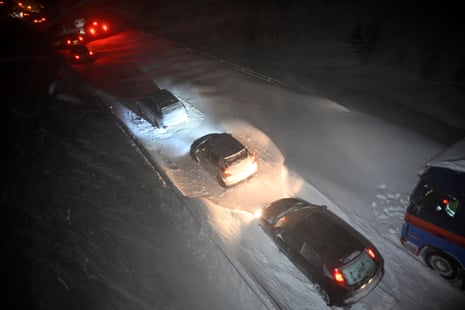Extreme cold and snowstorms disrupt travel and schools in Scandinavia
Extreme cold and snowstorms have disrupted transport and closed schools in Scandinavia while strong winds and heavy rain in western Europe have caused flooding and at least one death.
Temperatures fell below -40C in the Nordic region for a second day in a row on Wednesday. In Kvikkjokk-Årrenjarka in Swedish Lapland, the mercury dropped to -43.6C, the lowest January temperature recorded in Sweden in 25 years, the country’s TT news agency reported.
Extreme cold, snow and gale-force winds disrupted transport throughout the Nordic region, with several bridges closed and some train and ferry services suspended. Several schools in Scandinavia were also closed.
Police across most of Denmark urged motorists to avoid unnecessary trips as wind and snow battered the northern and western parts of the country.
The wave of cold air from Siberia and the Arctic region has also swept down over western Russia, with temperatures in Moscow and other areas plummeting to -30C, well below the average temperature for early January.
Read more here.
Key events
2 dead in Finnish Lapland

Miranda Bryant
A mother and child caught in an avalanche in Finnish Lapland have been found dead and around 1,000 cars were trapped overnight in a snowstorm in southern Sweden as extreme cold continued to hit the Nordics.
Police said the child was found dead on Thursday morning, near the place where his mother was found on Tuesday in Pyhäkuru after being hit by an avalanche during a ski hike.
“The sequence of events after the emergency call is hardly fully clear, but very poor weather conditions combined with an avalanche seem to have caused this sad and unusual accident in Finland,” said the head of the investigation, crime commissioner Kirsi Huhtamäki.
In Sweden, which has seen record low temperatures this week, rescue services and the army were on Thursday morning working to free passengers on the E22 between Hörby and Kristianstad in southern Sweden – some of whom had been trapped for 24 hours. The road is not due to reopen until Friday morning.
In the north of the country, the mercury dropped below -40C for the second consecutive day on Wednesday. It comes after Kvikkjokk-Årrenjarka in Swedish Lapland recorded a temperature of -43.6C on Tuesday night – the lowest January temperature recorded in Sweden in a quarter of a century.
Rescue services in Kristianstad on Thursday said that armed forces vehicles were collecting people who were stuck in their vehicles on the E22.
“The road is long, about 3 miles,” they said. “Cars and trucks need to be removed and the road must be cleared of snow before it can be opened to traffic.”
And here are images from Finland.


Here is a photo from Denmark, where vehicles were also stuck after a snowstorm.

It’s (very) cold in Finland
Here’s an update from the Finnish Meteorological Institute.

Here are photos from northern Europe, where cold temperatures and snow this week have led to major disruption.



Cars stranded in snow in Sweden
Cars are slowly being rescued from a road in Sweden where 1,000 vehicles were trapped by heavy snowfall.
Around 200 cars were still stuck on the E22 as of 10am local time (0900 GMT), Dagens Nyheter reported. Some have been trapped since Wednesday morning.
The road is expected to reopen on Friday morning, according to Swedish authorities.

Extreme cold and snowstorms disrupt travel and schools in Scandinavia
Extreme cold and snowstorms have disrupted transport and closed schools in Scandinavia while strong winds and heavy rain in western Europe have caused flooding and at least one death.
Temperatures fell below -40C in the Nordic region for a second day in a row on Wednesday. In Kvikkjokk-Årrenjarka in Swedish Lapland, the mercury dropped to -43.6C, the lowest January temperature recorded in Sweden in 25 years, the country’s TT news agency reported.
Extreme cold, snow and gale-force winds disrupted transport throughout the Nordic region, with several bridges closed and some train and ferry services suspended. Several schools in Scandinavia were also closed.
Police across most of Denmark urged motorists to avoid unnecessary trips as wind and snow battered the northern and western parts of the country.
The wave of cold air from Siberia and the Arctic region has also swept down over western Russia, with temperatures in Moscow and other areas plummeting to -30C, well below the average temperature for early January.
Read more here.







